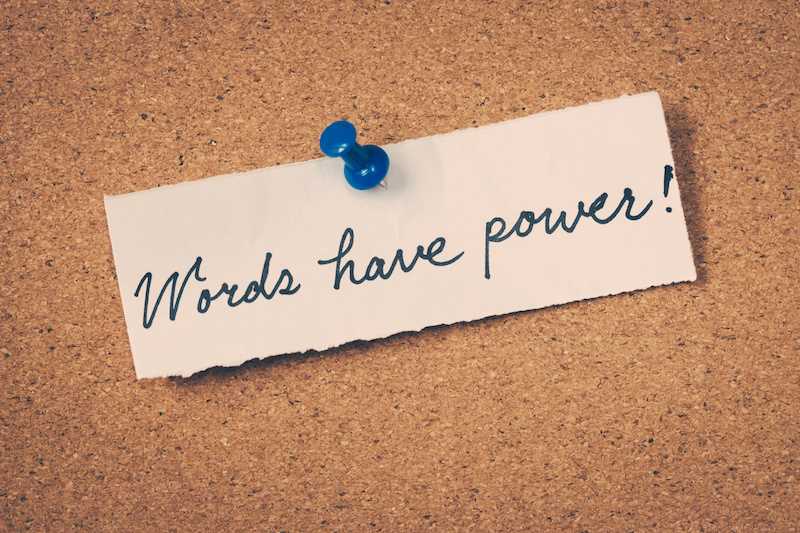I’m always looking for new customer service training ideas. Whenever I’m out in the marketplace–in restaurants, retail stores, community events, etc.–I’ve got my radar on for real life examples (both good and bad) that I can use for future sessions. And one of the simple behavior patterns I’ve noticed that separates exceptional customer service practitioners from their mediocre counterparts is vocabulary.
True customer service pros are what I call “power talkers.” They deliberately refrain from using weak, indecisive words and phrases and instead respond to customers with language that injects clarity, focus, and positive expectations into their conversations.

For example, consider how one simple, everyday word can weaken communication:
“We can schedule your car for service this afternoon, BUT we won’t have it done until tomorrow.”
“We received your request BUT the person who handles your account isn’t here today.”
“Robert is an excellent communicator, BUT his computer skills are weak.”
Notice how the word “but” negates everything that was said before it. This weak word saps all the energy from the conversation. How many times have you heard, “Yes, but…” and felt deflated knowing that your idea or comment is about to get a rebuttal?

A more powerful and energetic alternative is to replace the word “but” with “and.” Notice how it changes things:
“We can schedule your car for service this afternoon AND we will have that for you by noon tomorrow.”
“We received your request AND I will have the person who handles your account call you when she returns tomorrow.”
“Robert is an excellent communicator, AND he is developing his computer skills.”
If you’re seriously committed to building a strong personal brand, delivering exceptional customer service, and continually sharpening your leadership skills, the words you use matter. “Power Talking” is based on this simple but powerful truth: The words we use shape the outcomes we create in serving customers–and in everyday life.
Try it: I guarantee these simple changes in language will add substance and impact to the perceptions you create.
“Power Talking” is based on three principles of human communication:
1. People judge you–and you judge them–based on the words and phrases you use in your everyday communication. Consciously eliminating negative, powerless expressions and projecting a more positive, resourceful image will cause people to respond more positively to you.
2. The people you want to influence–your customers, co-workers, children, etc.–take cues from your language when deciding whether or not they will cooperate with you. While some words or phrases unconsciously sabotage our efforts to work with other people, others are extremely effective.
3. The words you use when talking to and about yourself help to shape your own self-image and they translate to your actions and behaviors.
Here are some examples of each of these principles from my own experiences:
At a recent auto retailing conference, one of the presenters–a successful car dealer–opened by saying, “You’ll have to excuse me, I’m not much of a public speaker.” Can you guess how his presentation went? It was awful.
Overhearing a phone call from an employee to a late-paying customer, she said, “I was wondering if you could send in your payment sometime soon.” A better way to get cooperation would be to simply ask, “When may I expect your payment?”
Responding to a “When will my car be done?” inquiry from an anxious customer, a service advisor said, “It should be done sometime tomorrow afternoon.” Instead of projecting such an unclear expectation, a better response would have been: “It will be done by 3pm tomorrow.” (Then have it done by noon and exceed the customer’s expectations.)
Although each of these examples seem simple, becoming a “power talker” is not easy. Years of cultural conditioning can weaken our diction, corrupt our clarity, and suck the life blood out of our communication.

Finally, together with “But,” here are five more popular powerless words and phrases to eliminate from your vocabulary:
1. Try. Known as “the king of wimpy,” try carries with it no commitment at all. As Yoda said in Star Wars, “Try, no. Do, or do not. There is no try.” Instead, be clear…and be firm. Candor and honesty will go much farther to build trust with your customer than “trying” ever will.
2. Have to. In customer service, saying “I’ll have to…” implies that serving your customer is going to be a burden, as in “I’ll have to check the availability and call you back.” Replace this negative line with the hospitable phrase, “I’ll be glad to…”
3. Basically. Together with “like,” “you know,” “well,” and a host of others, “basically” is what I call a “filler word” that serves no purpose; eliminate it–just say what you plan to say.
4. To be honest with you. When you hear this from someone, doesn’t it make you wonder, “Does this mean he is usually not honest?” Remove it–and simply say what you’re planning to say.
5. Should. When someone in customer service tells you, “I should have it done by…” how confident are you in such a weak commitment? Be decisive–say, “I will have it done by…” then over-deliver on your promise.
Remember, people judge you–and you judge them–based on the words and phrases used in your everyday communication. Regardless of your line of work, consciously eliminating negative, powerless expressions and projecting a more positive, resourceful image will welcome people to respond more positively to you.
Which powerless words and phrases do you encounter most often?

Once again, great stuff Bill. I cringe at how many of these poor word choices I use. Thanks for challenging us to do better with our words.
One word I am actively eliminating from my vocabulary is “just.” As in, “I just want to let you know…” or ” I just think that…” It seems to me to have an apologetic connotation and weakens the point…
Great point, Kelly. “Just” is one of those filler words that waters down purposeful communication.
Thank you for contributing!
Bill
I just love Kelly’s comment and just to let her know that I agree. 😂
I’d like to replace “but” with “and” more often…
but I struggle with that.
;-p